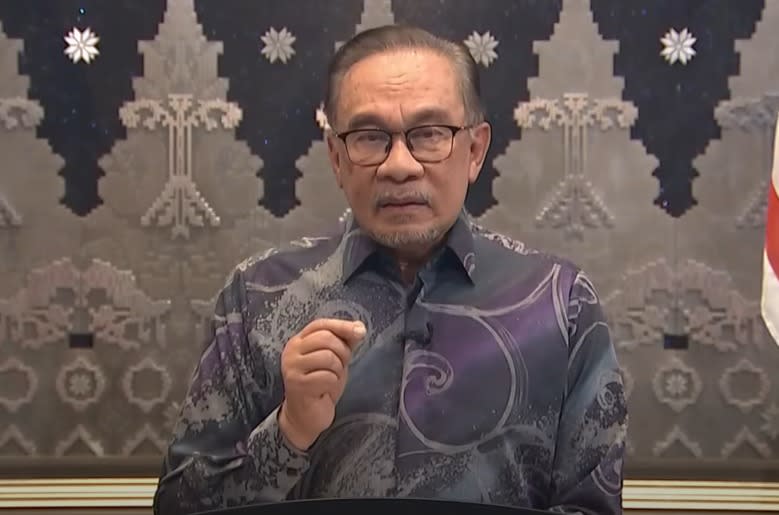Malaysian PM’s ‘surprise’ national address paints ‘rosy’ economic outlook, justifies diesel subsidy rationalisation

It was a ‘national address’ that sounded like a presentation of the annual budget.
Prime Minister Datuk Seri Anwar Ibrahim’s decision to speak to Malaysians via live television at 9pm, caught many by surprise earlier in the day. There were those who thought that the address was to calm the collective nerves of Malaysians following a series of incidents that rocked the normally-tranquil Southeast Asian nation since the beginning of the month.
These included the attack on three footballers, to the two policemen who were killed by a lone attacker when he stormed the Ulu Tiram police station in the southern state of Johor, on May 17.
The acid attack on national footballer Faisal Halim on May 5 hit the headlines worldwide, with German club Borussia Dortmund being the latest to stand in solidarity with the Selangor FC player. The culprit and the motive for the attack remain unknown.
Anwar started his speech by briefly touching on the series of attacks, saying he had met with representatives from the nation’s security, and law enforcement agencies. He assured Malaysians that everything will be done to deal with the situation.
He then quickly dived into Malaysia’s ‘rosy’ economic outlook, saying that the country had seen a 4.2 per cent increase in growth. This, he said, was better than initial projections. Anwar also added that the labour market had expanded by 2.1 per cent, with 16.4 million Malaysians now actively employed.
Anwar said Malaysia’s main focus was to address the people’s economy and to improve the Federal Government’s "weak" coffers.
“We are also serious in dealing with corruption. We need to address the shortcomings in our governance,” said Anwar, who was dressed in a batik shirt. His speech was accompanied by a slew of infographics, highlighting key points.
“Maybe there are those who look down on such talk, labelling it as political talk. This is normal. But I’m confident we can eradicate corruption,” he added.
Anwar spoke about the government’s successful attempts in stopping the smuggling of diesel, and in eliminating cartels that had been manipulating and profiting from the sale of chickens and cooking oil. He also touched on the need to focus on high technology sectors like semiconductors and artificial intelligence to bolster Malaysia’s competitiveness and attract more companies to invest in the country.
The end game, according to Anwar, was to improve the wellbeing of the rakyat (people).
Anwar then used the platform to justify the rationalisation of targeted subsidies, starting with diesel, in Peninsular Malaysia. He added that Sabah and Sarawak were exempted as “every family in Sabah and Sarawak uses diesel heavily”. He added that by targeting diesel subsidies, Malaysia would save a rough estimation of RM4 billion annually, allowing the government to improve cash aid and other forms of assistance to the people, including Sumbangan Tunai Rahmah, Sumbangan Asas Rahmah and early schooling aid (Bantuan Awal Persekolahan).
The move would likely see a spike in the cost of goods and services. To that, Anwar said the government would continue to provide subsidised diesel to traders using diesel-powered commercial vehicles. This involves 10 public transportation vehicles and 23 goods transport vehicles.
He, however, did not reveal when the subsidy rationalisation would be implemented.
Anwar was quick to add that there would be those who would “gripe” about the move, insisting that only the maha kaya (super rich) and non-Malaysians would be impacted by the decision. He also took a swipe at his critics, while emphasising the point that his unity government was taking all the necessary steps to elevate the status of Malaysians.
He ended his 42-minute long speech by saying that his Madani government would be brave enough to make reforms and that through sheer determination, and by getting out of the comfort zone, the nation’s economy would be strengthened further.
The post Malaysian PM’s ‘surprise’ national address paints ‘rosy’ economic outlook, justifies diesel subsidy rationalisation appeared first on Twentytwo13.


